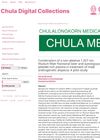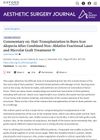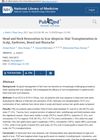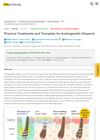 January 1998 in “Lasers in Surgery and Medicine”
January 1998 in “Lasers in Surgery and Medicine” Lasers are effective and safe for various medical treatments, including cancer, wound healing, and skin conditions.
 9 citations,
September 2015 in “Medical Clinics of North America”
9 citations,
September 2015 in “Medical Clinics of North America” The document explains how to do skin procedures, care after surgery, and when to use certain treatments.
[object Object]  January 2019 in “Chulalongkorn Medical Journal”
January 2019 in “Chulalongkorn Medical Journal” Using a special laser and platelet-rich plasma together is safe and improves hair growth in men with hair loss.
 July 2021 in “Aesthetic Surgery Journal”
July 2021 in “Aesthetic Surgery Journal” Using lasers and fat grafting before hair transplant improves hair growth on scarred skin.
 42 citations,
September 2018 in “Journal der Deutschen Dermatologischen Gesellschaft”
42 citations,
September 2018 in “Journal der Deutschen Dermatologischen Gesellschaft” Adult female acne requires a comprehensive treatment approach, including medical options and lifestyle changes, with attention to psychological well-being.

Microneedle technology is effective for skin rejuvenation and enhancing cosmeceutical delivery, with ongoing innovation and increasing commercialization.
 2 citations,
January 2019 in “Annals of dermatology/Annals of Dermatology”
2 citations,
January 2019 in “Annals of dermatology/Annals of Dermatology” A patient experienced permanent hair loss due to an allergic reaction to a corticosteroid injection.
 7 citations,
August 2018 in “Journal of Cosmetic and Laser Therapy”
7 citations,
August 2018 in “Journal of Cosmetic and Laser Therapy” Microneedling combined with skinbooster effectively treats striae rubrae, with confocal microscopy confirming collagen changes.
 3 citations,
July 2022 in “Indian journal of dermatology, venereology, and leprology”
3 citations,
July 2022 in “Indian journal of dermatology, venereology, and leprology” Patients with alopecia areata have higher oxidative stress and lower antioxidant levels.
 61 citations,
January 2019 in “American Journal of Clinical Dermatology”
61 citations,
January 2019 in “American Journal of Clinical Dermatology” The cause of Frontal Fibrosing Alopecia is unclear, diagnosis involves clinical evaluation and various treatments exist, but their effectiveness is uncertain.
 7 citations,
May 2022 in “International Journal of Environmental Research and Public Health”
7 citations,
May 2022 in “International Journal of Environmental Research and Public Health” Isotretinoin therapy for acne can cause many reversible side effects, mainly mild skin conditions, and patient understanding of these effects can improve treatment adherence.
 26 citations,
July 2021 in “Frontiers in Cell and Developmental Biology”
26 citations,
July 2021 in “Frontiers in Cell and Developmental Biology” The review suggests that a special cell-derived treatment shows promise for various skin conditions and hair growth but needs more research for confirmation.
 September 2021 in “PubMed”
September 2021 in “PubMed” Hair transplantation is effective for treating scar-related hair loss on the head and neck.
1 citations,
August 2024 in “Cosmetics” Melasma treatment is difficult, but combination therapies and personalized plans show promise.
 25 citations,
May 2020 in “Aesthetic Surgery Journal”
25 citations,
May 2020 in “Aesthetic Surgery Journal” The regenerative solution, tSVF, is a safe and effective treatment for various conditions like aged skin, scars, wounds, and more, but more research is needed to find the best way to use it.
[object Object] 
Low-level laser therapy is the most effective for hair loss, but other treatments also show promise.

Using a specific laser and platelet-rich plasma together can effectively improve hair thickness and density in men with hair loss, without serious side effects.
 2 citations,
January 2022 in “Skin appendage disorders”
2 citations,
January 2022 in “Skin appendage disorders” A combination of methotrexate injections and CO2 laser treatment led to complete hair regrowth in two patients with hard-to-treat alopecia.
 February 2019 in “International journal of research in dermatology”
February 2019 in “International journal of research in dermatology” The combined treatments were highly effective for improving atrophic acne scars.
July 2024 in “International Journal of Molecular Sciences” RF-based therapies might help treat hair loss.
 67 citations,
January 2022 in “Theranostics”
67 citations,
January 2022 in “Theranostics” Advanced nanocarrier and microneedle drug delivery methods are more effective, safer, and less invasive for treating skin diseases.
 October 2020 in “Journal of Pharmaceutical Sciences”
October 2020 in “Journal of Pharmaceutical Sciences” Topical finasteride with EGCG or TA improves drug release and dermal uptake, potentially treating hair loss effectively.
 2 citations,
April 2022 in “Indian Journal of Dermatology, Venereology and Leprology”
2 citations,
April 2022 in “Indian Journal of Dermatology, Venereology and Leprology” Platelet-rich plasma is a promising and safe treatment for increasing hair density and thickness in women with chronic telogen effluvium.
 79 citations,
October 2015 in “Journal of Dermatological Treatment”
79 citations,
October 2015 in “Journal of Dermatological Treatment” Platelet-rich plasma may have some benefits in dermatology, but there's not enough evidence to widely recommend its use.
5 citations,
January 2020 in “Acta dermatovenerologica Alpina, Pannonica et Adriatica (Tiskana izd.)” Injecting platelet-rich plasma or applying it with a laser or microneedling can treat hair loss effectively. The laser and microneedling methods cause less pain.
 October 2024 in “Skin Appendage Disorders”
October 2024 in “Skin Appendage Disorders” PRP is popular for hair restoration but needs better research methods to confirm its effectiveness and safety.
 11 citations,
October 2016 in “Biomedicine & Pharmacotherapy”
11 citations,
October 2016 in “Biomedicine & Pharmacotherapy” Both human platelet lysate and minoxidil can promote hair growth, but they affect different genes and cell survival rates.
 4 citations,
January 2015 in “Journal of clinical & experimental dermatology research”
4 citations,
January 2015 in “Journal of clinical & experimental dermatology research” PRP injections may slightly improve hair density and count for male hair loss, but more research is needed.
 August 2011 in “Faculty Opinions – Post-Publication Peer Review of the Biomedical Literature”
August 2011 in “Faculty Opinions – Post-Publication Peer Review of the Biomedical Literature” 5% minoxidil foam used once daily is as effective as 2% minoxidil solution used twice daily for hair loss in women, but with fewer side effects like itching and dandruff.
 59 citations,
March 2020 in “Journal of Biomedical Science”
59 citations,
March 2020 in “Journal of Biomedical Science” Understanding how hair follicle stem cells work can help find new ways to prevent hair loss and promote hair growth.



























